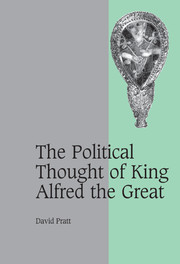Book contents
- Frontmatter
- Contents
- Acknowledgements
- List of abbreviations
- Note on citations
- Chapter 1 INTRODUCTION
- Part I The West Saxon Political Order
- Part II Alfredian Discourse and its Efficacy
- Chapter 7 THE FIELD OF ALFREDIAN KNOWLEDGE
- Chapter 8 THE CONSTRUCTION OF ALFREDIAN DISCOURSE
- Chapter 9 ALFREDIAN TECHNOLOGY: BOOKS AND ÆDIFICIA
- Chapter 10 THE HIERDEBOC AS A TREATISE OF POWER
- Chapter 11 THE DOMBOC AS A REORIENTATION OF ROYAL LAW
- Chapter 12 TRIBULATION AND TRIUMPH IN THE FIRST FIFTY PSALMS
- Chapter 13 THE SEARCH FOR A SATISFACTORY CONSOLATION
- Chapter 14 SEEING GOD AS HE IS
- Chapter 15 CONCLUSION
- Appendix: West Frankish deployment of Solomon's dream
- Bibliography
- Index of manuscripts
- General index
- Cambridge Studies in Medieval Life and Thought Fourth Series
Chapter 14 - SEEING GOD AS HE IS
Published online by Cambridge University Press: 06 July 2009
- Frontmatter
- Contents
- Acknowledgements
- List of abbreviations
- Note on citations
- Chapter 1 INTRODUCTION
- Part I The West Saxon Political Order
- Part II Alfredian Discourse and its Efficacy
- Chapter 7 THE FIELD OF ALFREDIAN KNOWLEDGE
- Chapter 8 THE CONSTRUCTION OF ALFREDIAN DISCOURSE
- Chapter 9 ALFREDIAN TECHNOLOGY: BOOKS AND ÆDIFICIA
- Chapter 10 THE HIERDEBOC AS A TREATISE OF POWER
- Chapter 11 THE DOMBOC AS A REORIENTATION OF ROYAL LAW
- Chapter 12 TRIBULATION AND TRIUMPH IN THE FIRST FIFTY PSALMS
- Chapter 13 THE SEARCH FOR A SATISFACTORY CONSOLATION
- Chapter 14 SEEING GOD AS HE IS
- Chapter 15 CONCLUSION
- Appendix: West Frankish deployment of Solomon's dream
- Bibliography
- Index of manuscripts
- General index
- Cambridge Studies in Medieval Life and Thought Fourth Series
Summary
Justly compared with the Froferboc, the remaining text in the royal corpus offers no less an expression of learned ambition. The version of Augustine's Soliloquia confirms the scope of royal learned resources, raising many questions of their deployment. The source-text held a distinctive place, as a product of Augustine's early Neo-Platonism; royal handling extended far beyond translation, to imaginative re-composition. Only Book I was rendered in anything approaching its entirety. Book II followed the substance of Augustinian claims, but with much independent argument; whereas the Latin text was unfinished, the vernacular version added a third section effectively ‘completing’ Augustine's text. There can be no single explanation for these complex manoeuvres; as with the Consolatio, much hinged on esoteric aspects of Latin philosophy. The Soliloquia offered a further instance of Christian Neo-Platonic dialogue. The nature of divine knowledge, the status of truth, the immortality of the soul: all found extensive treatment in soothing steps of wise comprehension. Surpassing even Boethius in intensity of dialectic, Augustine's philosophy maximized man's capacity for understanding while restricting its practical attainment. Not only was the dialogue incomplete; Augustine had soon abandoned Neo-Platonism, offering revised, scriptural positions in later writings.
The royal version took full account of the text's problematic status, while reorienting its implications towards contemporary priorities. The translation assigned limits to all earthly understanding, in accordance with later Augustinian pronouncement; the ‘completed’ text left enlightenment to the afterlife alone. Royal argumentation matched this framework with arguments appropriate to earthly need.
- Type
- Chapter
- Information
- The Political Thought of King Alfred the Great , pp. 308 - 337Publisher: Cambridge University PressPrint publication year: 2007

